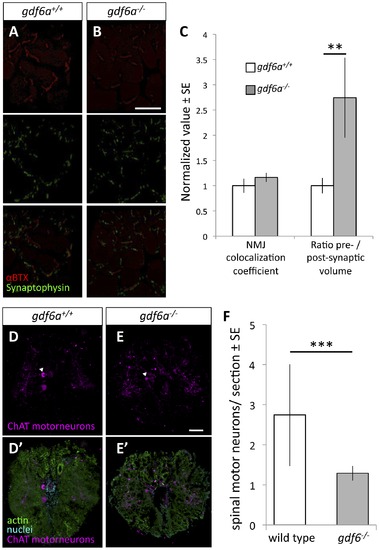Fig. 3
- ID
- ZDB-FIG-140723-18
- Publication
- DuVal et al., 2014 - Growth differentiation factor 6 as a putative risk factor in neuromuscular degeneration
- Other Figures
- All Figure Page
- Back to All Figure Page
|
Zebrafish harboring homozygous mutations in gdf6 exhibit altered neuromuscular junctions and fewer spinal motor neurons. A-B. Assessment of neuromuscular junction (NMJ) morphology including presynaptic (synaptophysin) and postsynaptic (αBTX) compartments in 9 month old gdf6-/- and gdf6+/+ siblings by immunohistochemistry. C. ALS-like increases in motoneuron pre-synaptic volumes are observed in gdf6-/- fish when normalized to post-synaptic volumes (**p = 0.009, n = 5 fish per genotype). Coefficients of colocalization for pre- and post-synaptic compartments are not altered, as is expected in later-stage zebrafish ALS models. D-E. Motor neuron cell bodies were identified in cross-sections of spinal cord using immunohistochemistry against choline acetyl transferase (ChAT, e.g. arrowheads) in nine month old gdf6+/+ and gdf6-/- fish (panels A and B, respectively). Bottom panels affirm motoneuron cell body identification using actin and nuclear counter-stains. F. gdf6-/- fish have approximately 50% the abundance of spinal motor neurons compared to sibling gdf6+/+ fish. (Mann-Whitney U Test, *** p<0.001, n>50 sections from 4 fish per genotype, researcher blinded to genotype during quantification). Scale bar = 60 μm in A,B and 50 μm in D,E. |
| Antibodies: | |
|---|---|
| Fish: | |
| Anatomical Terms: | |
| Stage: | Adult |
| Fish: | |
|---|---|
| Observed In: | |
| Stage: | Adult |

